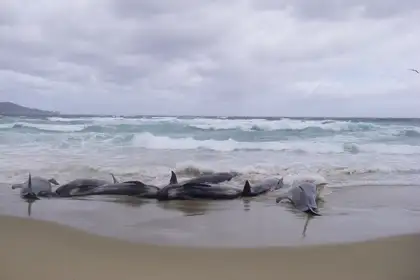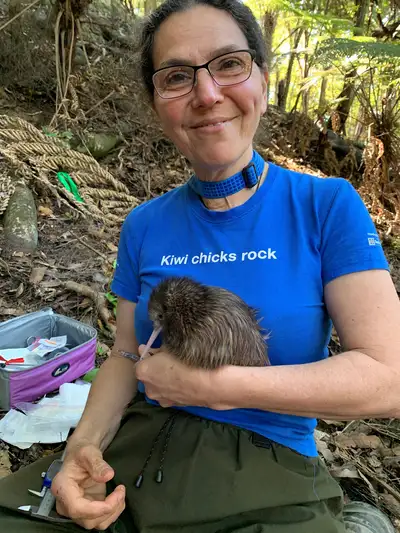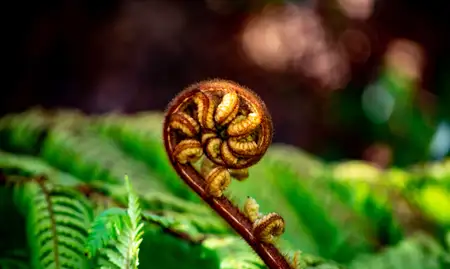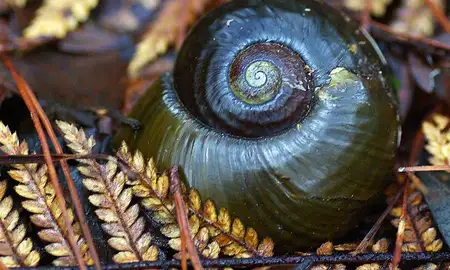
A project that will investigate how indigenous knowledge can be included in whale stranding response efforts is one of two that has received the funding. Photo credit: Emma Betty.
Professor Karen Stockin and Dr Ramari Stewart from Te Kauika Tangaroa Charitable Trust: Ko ahau te tohorā, te tohorā ko ahau, I am the whale, and the whale is me.
Professor Stockin’s project Ko ahau te tohorā, te tohorā ko ahau, I am the whale, and the whale is me – A call for Mātauranga Māori to improve whale stranding response in Aotearoa has been co-developed with Dr Ramari Stewart of the Te Kauika Tangaroa Charitable Trust. The project will pave the way for non-Māori, Māori and iwi to address whale strandings across the motu by demonstrating the necessity of mātauranga embedment in current stranding research and protocols.
Acknowledging the frequency of whale strandings in Aotearoa New Zealand and the likely increase of them due to human impacts on our moana, Dr Stewart and Professor Stockin recognise the need for mātauranga Māori to be embedded within current operating procedures relating to stranding response.
The kaupapa aims to afford tohorā the benefits of applied scientific advancement and appropriate cultural support. The project will enable and empower hapū members to bring mātauranga Māori when they attend strandings in their rohe.
The VMCF will provide time and space for Professor Stockin and Dr Stewart to form an important partnership, as both are experts in marine mammal science and recognise tohorā as taonga. Professor Stockin says they both share a curiosity, passion and interest in strandings.
The project will investigate how indigenous knowledge can be included in response efforts and explore current mātauranga Māori within related research to examine how this aligns with current practice at whale strandings.
Professor Stockin and Dr Stewart aim to utilise former Māori naturalist practices to support a shared kaupapa on best practices for how to respond to live whales, assess the efficacy and cultural appropriateness of whale euthanasia and safely sample carcasses.
The VMCF panel feedback says, “We were heartened to receive this application given the lifetime contributions and leadership of the principal researchers. They also valued the national significance of the outcomes of this project to empower mana whenua in their role as kaitiaki. The project has practical and national benefits that should deliver mutual benefit to iwi Māori practitioners and marine conservation.”
In addition to the reigniting of mātauranga to whale stranding practices, this connect scheme fulfils VMCF’s values of taiao by bringing mātauranga Māori back into the whale stranding protocols. This will empower hapū and iwi relationships with the land and sea and hauora/oranga by bringing together the current protocols with mātauranga Māori and providing kaupapa for safe treatment of whales and their resources.
The project will improve the networks, skills and capability to respond well to whale strandings.
Professor Stockin says, "The ultimate goal is the best animal welfare outcomes possible by aligning mātauranga Māori and Western science, as well as reigniting Māori connections with tohorā as important ecosystem sentinels.”
Professor Isabel Castro and Nga Hapū o Te Rawhiti: Kiwi Whakapapa project.
Professor Castro’s proposal for the Kiwi Whakapapa project: Improving kiwi population success through genetically informed tomo, will be led by Nga Hapū o Te Rawhiti.
Since 2013, Massey’s Behavioural Ecology and Conservation Group (BECG) has collaborated with Nga Hapū o Te Rawhiti to understand the genetic structure and health of key kiwi populations. Professor Castro has been building and sustaining a relationship with them since 2012 and says she is touched by the fact they consider her whānau.
The relationship initially began from an invitation by the iwi to collaborate on kiwi whakapapa (genetics) for translocation efforts.
Professor Castro says, “This project is about the whakapapa of all of us, not just the kiwi, but also the people, birds, Māori aspirations. The translocation of the kiwi is like tomo, a marriage organised to strengthen ties and blood lines.”

Professor Isabel Castro with Octavia the kiwi.
This Vision Mātauranga Capability Fund (VMCF) award will support the next crucial stage in the project, which will widen the collaborative network of hapū across Te Tai Tokerau to ensure better outcomes for both kiwi and hapū.
The building of this hapū network aligns with VMCF’s themes of taiao, achieving environmental sustainability through iwi and hapū relationships with land and sea and mātauranga, exploring indigenous knowledge and science and innovation.
The proposal reports that many hapū and iwi have already been engaged, including Ngāti Rahiri – Ngāti Kawa, Kapotai, Ngāti Manu, Ngati Rēhia - Ngāti Torehina, Ngāti Kura, Mahurehure, Te Hikatu, Ngāti Hine, Te Rarawa, Te Roroa, Ngāti Wai, Ngāti Manuhiri, Ngāi Tai, Russell State Forest Hapū Collective and Te Ātiawa.
The VMCF panel feedback says, “This project represents a unique relationship between Māori and researchers that benefits conservation. It empowers marae and is a kaitiaki-enhancing project developing long term relationships. The project is iwi-led and is an excellent exemplar of Māori leadership in nationally significant research.”
The Ministry of Business, Innovation and Employment (MBIE) offers two options for VMCF projects: connect and placement. The first is to build relationships between Māori organisations and science and innovation systems. The second is for on-location collaboration to enhance the development of individuals through partner placement.
The Kiwi Whakapapa project aims to connect back with the many hapū and iwi in Te Tai Tokerau who have already participated in this research, to share results and discuss the future of the project. Hui will take place over the next two years, the first being held at Te Rawhiti Marae. These hui will provide space for information sharing and mātauranga that will allow the kaitiaki mahi to continue.
Initial benefits will be seen for brown kiwi in Te Tai Tokerau, but it is expected that the benefits will spread to brown kiwi on the rest of Te Ika-a-Māui and other species on Te Waipounamu.
More information about the Te Pūnaha Hihiko funding is available here.
Related news
Three Massey projects awarded MBIE Vision Mātauranga Capability funding
Of the 16 grants funded across the motu, Massey is leading three research projects, and partnering on another.

Strong result in MBIE Vision Mātauranga Capability Fund
The Ministry of Business, Innovation and Employment has awarded three Massey University research projects nearly $750,000 from the Te Pūnaha Hihiko: Vision Mātauranga Capability Fund.
